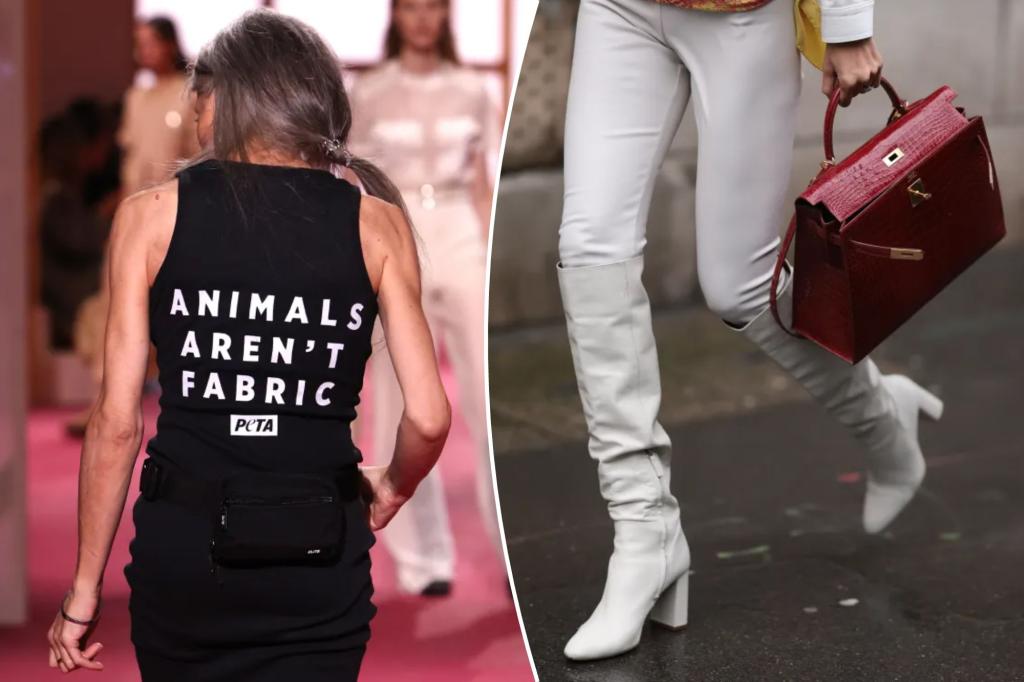Summarize this content to 2000 words in 6 paragraphs
London Fashion Week is banning designers from showing collections that feature exotic animal skin, a step forward for the British Fashion Council’s sustainability initiatives.
Designers will now be forced to agree to the new policy when applying to be included on the official London Fashion Week calendar, a first for the “big four” international fashion weeks.
While Copenhagen Fashion Week banned exotic skins from the catwalk earlier this year, fashion weeks in Milan, Paris and New York have yet to follow suit.
“As part of the British Fashion Council’s Positive Fashion Initiative, London Fashion Week is fur-free, wild skins free and exotic skins free,” a spokesperson from the BFC told The Post via email.
“We know that many of our designers have strong ethics and are working towards more sustainable practices and accurate measurement. We are committed to providing our network with tools and resources to help them on this journey.”
The Post has reached out to New York Fashion Week representatives for comment.
The new policy — announced this week by the council’s deputy director of policy and engagement David Leigh-Pemberton — is a step forward for the BFC’s commitment to sustainable and ethical practices through the council’s Institute of Positive Fashion, which spearheads “social, environmental and sustainability programs.”
“The BFC continues to lead work on circularity, low carbon transition, DE&I and social impact within the fashion sector,” the spokesperson added, noting that the BFC is now working with designers and the fashion community on their “approach to feathers on the catwalk.”
“Thank you to those individuals and organizations whose collective constructive challenge have helped evolve our approach to these issues.”
The debate over animal products — from leather and feathers to fur and skins — is hotly contested within the industry amid pressures from animal advocacy and sustainability groups, but luxury designers still utilize them.
Kering, the parent company of brands such as Gucci, Bottega Veneta and Balenciaga, bans fur, but its labels still use exotic skins, while LVMH, the parent company of Loewe, Givenchy and Celine, has barred neither the use of exotic skins nor furs, according to Vogue Business.
Many designers, however, have already abandoned real furs and exotic skins — such as snake, alligator and crocodile — in favor of more sustainable and ethical practices.
Chanel ditched exotics and furs back in 2018, while Marc Jacobs renounced the use of fur earlier this year after “bullying” from protestors, stating his namesake brand “does not work in, use or sell fur, nor will we in the future.”
Animal rights group PETA has especially been outspoken about the use of animal products in the fashion industry, as protestors associated with the advocacy nonprofit organization have stormed runways over the years.
Last year, Coach’s NYFW catwalk was crashed by PETA protestors donning signage reading “Coach leather kills,” while demonstrators popped up at London Fashion Week in March and again at Paris Fashion Week in September.
PETA told The Post that “tens of thousands” of the organization’s supporters have been contacting the BFC to encourage the ban, calling its ban on fur “long-overdue.”
“We salute the compassionate British designers who helped usher in this new policy by recognizing that crocodiles, lizards, snakes and other animals should never be bludgeoned, impaled or beheaded for their skin,” Yvonne Taylor, the UK vice president of corporate projects at PETA, told The Post in a statement.
“The future of fashion is animal-free – and the future is now.”















